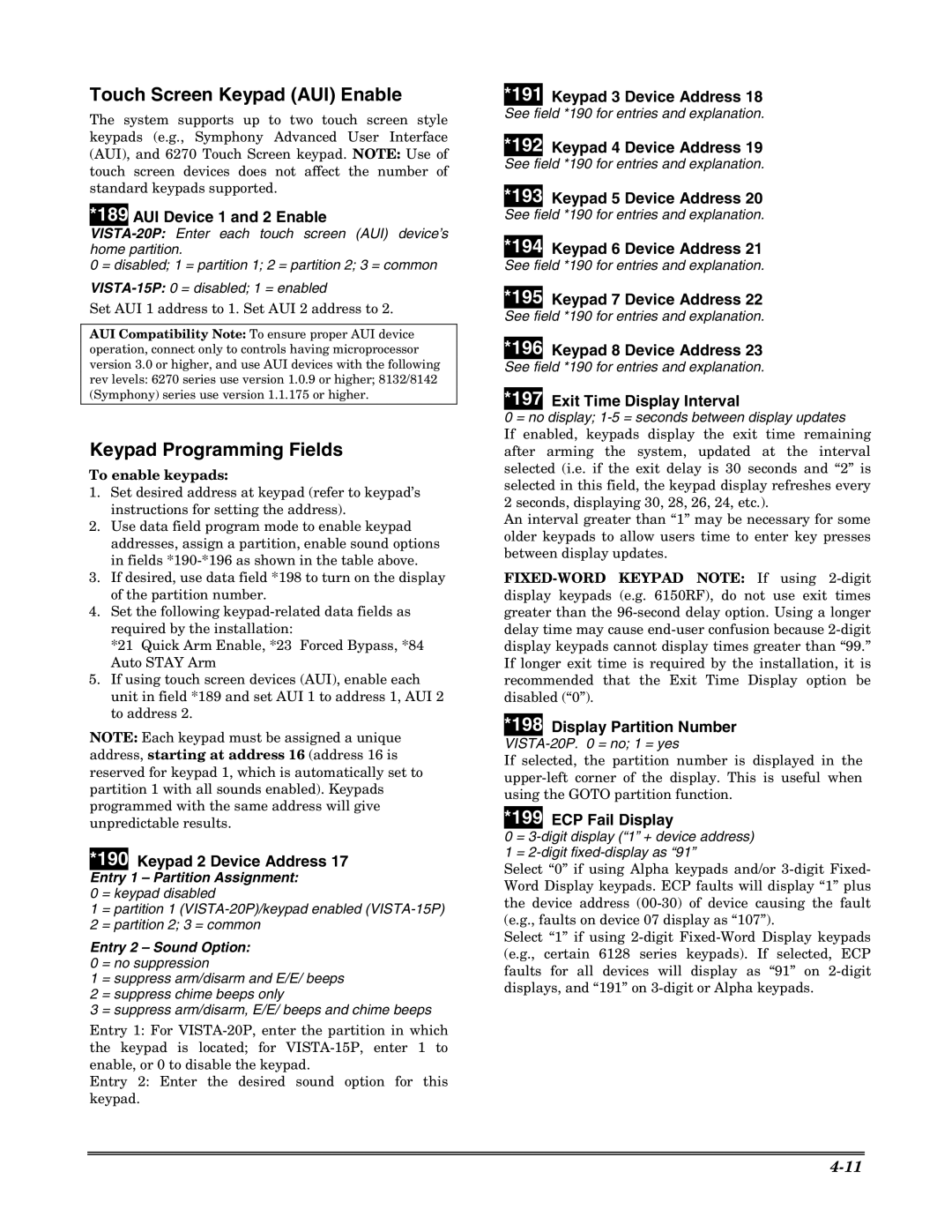
Touch Screen Keypad (AUI) Enable
The system supports up to two touch screen style keypads (e.g., Symphony Advanced User Interface (AUI), and 6270 Touch Screen keypad. NOTE: Use of touch screen devices does not affect the number of standard keypads supported.
*189 AUI Device 1 and 2 Enable
0 = disabled; 1 = partition 1; 2 = partition 2; 3 = common
Set AUI 1 address to 1. Set AUI 2 address to 2.
AUI Compatibility Note: To ensure proper AUI device operation, connect only to controls having microprocessor version 3.0 or higher, and use AUI devices with the following rev levels: 6270 series use version 1.0.9 or higher; 8132/8142 (Symphony) series use version 1.1.175 or higher.
Keypad Programming Fields
To enable keypads:
1.Set desired address at keypad (refer to keypad’s instructions for setting the address).
2.Use data field program mode to enable keypad addresses, assign a partition, enable sound options in fields
3.If desired, use data field *198 to turn on the display of the partition number.
4.Set the following
*21 Quick Arm Enable, *23 Forced Bypass, *84 Auto STAY Arm
5.If using touch screen devices (AUI), enable each unit in field *189 and set AUI 1 to address 1, AUI 2 to address 2.
NOTE: Each keypad must be assigned a unique address, starting at address 16 (address 16 is reserved for keypad 1, which is automatically set to partition 1 with all sounds enabled). Keypads programmed with the same address will give unpredictable results.
*190 Keypad 2 Device Address 17
Entry 1 – Partition Assignment: 0 = keypad disabled
1= partition 1
2= partition 2; 3 = common
Entry 2 – Sound Option:
0 = no suppression
1 = suppress arm/disarm and E/E/ beeps
2 = suppress chime beeps only
3 = suppress arm/disarm, E/E/ beeps and chime beeps
Entry 1: For
Entry 2: Enter the desired sound option for this keypad.
*191 Keypad 3 Device Address 18
See field *190 for entries and explanation.
*192 Keypad 4 Device Address 19
See field *190 for entries and explanation.
*193 Keypad 5 Device Address 20
See field *190 for entries and explanation.
*194 Keypad 6 Device Address 21
See field *190 for entries and explanation.
*195 Keypad 7 Device Address 22
See field *190 for entries and explanation.
*196 Keypad 8 Device Address 23
See field *190 for entries and explanation.
*197 Exit Time Display Interval
0 = no display; 1-5 = seconds between display updates
If enabled, keypads display the exit time remaining after arming the system, updated at the interval selected (i.e. if the exit delay is 30 seconds and “2” is selected in this field, the keypad display refreshes every 2 seconds, displaying 30, 28, 26, 24, etc.).
An interval greater than “1” may be necessary for some older keypads to allow users time to enter key presses between display updates.
*198 Display Partition Number
VISTA-20P. 0 = no; 1 = yes
If selected, the partition number is displayed in the
*199 ECP Fail Display
0=
1=
Select “0” if using Alpha keypads and/or
Select “1” if using
